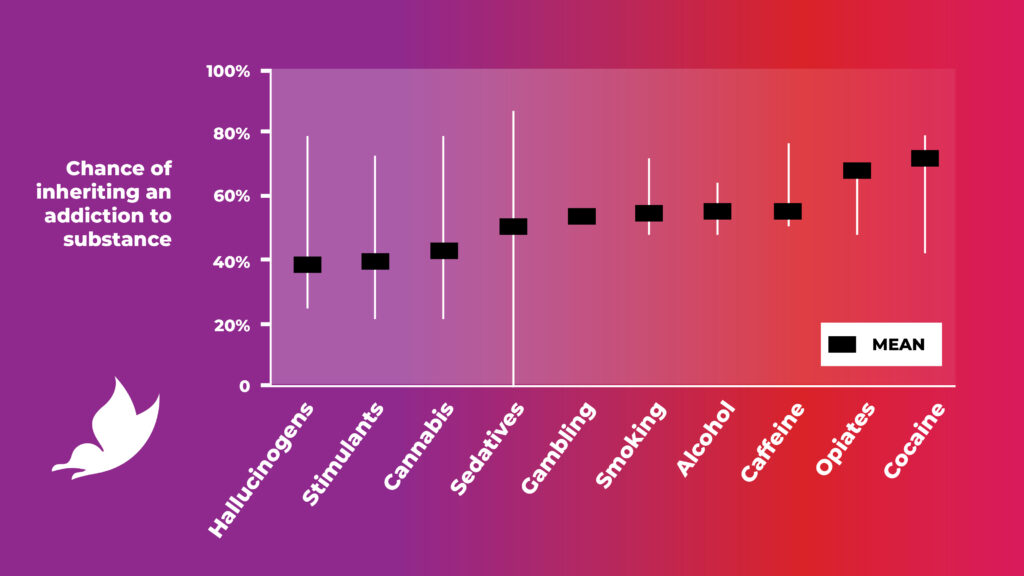Many people have relatives that experienced a drug or alcohol addiction, leading them to wonder if substance use disorder is something that runs in the family. According to the latest science, the answer is “likely.” The presence of multiple genetic factors, or information contained in your DNA, influences many addictions. These factors can influence the way a person’s body responds to certain substances or handles stress.
The University of Utah, through careful examination of addiction inheritability studies, concludes that “a person’s genetics account for 40 to 60% of their risk” for addiction. The odds of developing a substance use disorder (SUD) due to genetic inheritance are slightly different depending on the drug. However, if you have a close relative (father, mother or sibling) or multiple relatives who developed an addiction, you should regard it as a clue to be careful when using substances of any kind.
How are Genetics and Addiction Related?
What is DNA?
“Deoxyribonucleic acid,” or DNA, is the chemical name for an inconceivably long yet microscopically small chain of molecules that reside in the nucleus of each cell in your body. The organization of DNA forms a “double helix” pattern, resembling a rope with two intertwined strands. A single nucleus exists within a cell, the microscopic unit that constitutes the smallest observable building block of the human body. On average, 100 trillion interconnected cells comprise each adult human body. To understand the DNA inside each cell’s nucleus, picture it as an extensive scroll of instructions that govern nearly every physical aspect of your body’s functioning. Your DNA contains numerous instructions, directing the body on which tasks it needs to perform.
The presence of genes that may predispose some to developing an addiction does not fully explain why individuals develop an addiction. Other factors, such as environmental or psychological influences, can cause you to develop a SUD. If an addiction is severe enough, it may require assistance from a medical professional or treatment center [GET TREATMENT] like Landmark Recovery.
Do Genetics Play a Role in Addiction?
According to the National Institutes of Health (NIH), “family studies that include identical twins, fraternal twins, adoptees, and siblings suggest that as much as half of a person’s risk of becoming addicted to nicotine, alcohol, or other drugs depends on his or her genetic makeup.” This explains why using genetics to determine possible biological origins for drug addiction is so important to those studying the causes of the disease.
Is There a Specific Gene That Causes Addiction?
The University of Pennsylvania (UPenn) states that “initial theories of a single ‘alcoholic gene’ have essentially been disproven by research.” Decades of research have led scientists to agree that no single gene can determine the susceptibility of an individual to an alcohol use disorder (AUD). The NIH agrees with this:
“Research shows that genes are responsible for about half of the risk for AUD. Therefore, genes alone do not determine whether someone will develop AUD. Environmental factors, as well as gene and environment interactions account for the remainder of the risk.”
According to a 2013 study published in Nature Reviews Gastroenterology & Hepatology, there are a number of key points to consider regarding possible genetic causes of AUD:
- AUD is a common, complex genetic disease, with many variants in numerous genes contributing to the risk of developing this disorder.
- As samples of increased size are assembled for meta-analyses and an extended range of alleles are tested, the roles of many additional genes will probably be uncovered.
- Genes that alter how much alcohol a person consumes and how often affect the risk of many of these diseases.
Can Addiction Run in the Family?
Yes, addiction can run in your family. If you have an uncle that suffers from an AUD, but your own parent doesn’t, then something may cause your uncle to have a predisposition to the disease, especially if an AUD is something you’ve struggled with, too. This doesn’t mean that you’re safe from developing an addiction, as certain influences could originate from a series of recessive genes, or genetic information that skipped a generation, such as your father.
It’s easy to spot patterns of addiction in a family tree, leading many to conclude that something has to be intergenerationally shared. This is a fair conclusion that can explain addiction throughout a family tree but isn’t always the sole cause. As genetics only partially explain addiction but have a significant influence, another shared similarity in circumstances might contribute to intergenerational addiction. Environmental or psychological/behavioral causes can be a major influence on the development of an addiction. For example, mood disorders (such as depression) or trauma can heavily influence the development of an addiction as a response to those factors. Further complicating that point is the fact that “not all people exposed to early trauma develop psychopathology, indicating differences in resiliency,” according to a 2012 study on the genetic basis of addictive disorders by Drs. Francesca Ducci and David Goldman.
Can Addiction Skip Generations?
Your DNA doesn’t express all its genes. When your body follows instructions encoded in your DNA, it expresses genetic information. Some sequences can be recessive, which means they don’t get expressed and might skip generations, or dominant, which means they override recessive information and get expressed. Determining whether a substance use disorder (SUD) can skip a generation is difficult because addiction involves multiple genetic sequences that can be dominant or recessive, rather than just a single set of instructions in your DNA.
If your genetic information related to addiction is expressed more, you can expect to be more prone to experiencing a SUD. Addiction can potentially skip a generation if a combination of genetic factors makes you less susceptible to a SUD. To determine the likelihood of developing a SUD, you can examine your family tree and identify how often addiction appears among your family members.
Key Points
An AUD, for example, can skip generations. If your parents aren’t suffering from an AUD, that doesn’t mean that you aren’t also immune from developing one, especially if you had a grandparent that did. With so many factors that go into figuring out the likelihood of inherited addiction influences, UPenn has put together a list of four key points to remember when considering inherited AUDs:
- If you have a parent that suffers from an AUD, that doesn’t mean you will, too.
- While studies show a significant increase in the incidence of AUD in the children of those who suffer from one, the father to son transmission is particularly strong.
- In Type 2 alcoholism, which is relegated to men, the son of a father with an AUD is 9 time at greater risk of suffering from the same compared to the general population.
- Recent studies suggest that a heroin use disorder is even more mediated by genetics than an AUD.
UPenn also cautions those who might still assume that addiction is an issue of will or action and not a disease.
“If one researches families in which there’s an addicted person, one will invariably find another addicted person in the family—an aunt, uncle, grandfather—sometimes with a different form of addiction—but it’s GENETICS, not willpower…that plays a vital role in determining whether one will have the disease of addiction.”
Can You Be Born with an Addiction?
DNA certainly plays a significant role in the development of many addictions, but that doesn’t mean that you can be born with an active addiction. You may develop a SUD later because of a biochemical, environmental, or genetic predisposition toward developing one. Once the brain is exposed to a particular substance, it may respond to it in a way that makes you crave it. This is when the disease develops in an individual, but it doesn’t mean that you’re automatically born with, for example, an opioid use disorder.
Are All Substances Equally Addicting?
Studies show that the inheritability of addiction differs depending on the substance in question. Hallucinogens as an addictive agent show the lowest probability of being inheritable, which is much less than the odds of the likely inheritability of an addiction to cocaine or opiates.

According to the 2012 genetic basis study, the actual initiation of substance use may even be inheritable:
“Heritability estimates are usually higher for addiction than for substance use; however, ‘no pathologic drug use’ and ‘initiation of use’ are also heritable, indicating that genetic influences play a role also in initiation.”
Regarding the complication of saying all substances are addictive, the study also states that there is no single genetic component or series of components that affect addiction to any/all illicit substances:
“In this study genetic risk could not be explained by one factor acting across all substances. Rather, two shared factors were found: an illicit agent factor mainly explaining vulnerability to cannabis and cocaine dependence and a licit agent factor mainly explaining vulnerability to alcohol, caffeine, and nicotine.”
What Else Causes Addiction?
A biodeterminist view, or the idea that only biological factors govern the future and behavior of an individual, is not a complete explanation of why you may be suffering from addiction. The reality is something close to a combination of biological and environmental factors. Due to the complexities in individual cases of addiction, it’s currently impossible to the exact odds you might develop one, but spotting potential influences is a good idea. Researchers and doctors look at family history to give them an idea of how likely a diagnosis might be—addiction is no exception. Scientists and psychologists likely won’t settle the nature-versus-nurture debate on human behavior anytime soon. However, exploring this debate in the context of addiction can help determine what to target in patients moving forward. Here are other factors that can drive someone to develop an addiction.
Trauma
Understanding that certain environmental or experiential factors may influence a patient’s psychology is necessary when identifying individuals predisposed to addiction or treating those who already have one. The influence of trauma, specifically adverse childhood experiences (ACEs), should not be understated in influencing the development of addiction in individuals, either.
Doctors use a special test to identify events in a patient’s life that might contribute to addiction development. This test helps determine an individual’s ACE score. An ACE score is useful for identifying if therapy should target a traumatic cause for addiction in treatment. It also helps detect other psychiatric disorders in patients. Some patients in addiction treatment may have co-occurring disorders. These disorders can significantly influence the development of their addiction.
Stress
Stress can be an influence on addiction. According to a 2008 study published in the medical journal Addiction Reviews, “preclinical research…shows that stress exposure enhances drug self-administration and reinstates drug seeking in drug-experienced animals.” Factors that can cause a lasting biochemical response to stress include early life stress, child maltreatment, and accumulated adversity. Substance use can further drive alterations in stress and motivational systems, affecting stress regulation, impulse control, and the ongoing compulsive pursuit of drugs and susceptibility to relapse.
Listen to the Experts Discuss Addiction and Biology
Our director of clinical outreach, Michael Walsh, spoke with Lisa Woititz on the topic of biology and addiction recently. You can listen to the podcast here.
Learn More About Landmark Recovery
Perhaps one day, with futuristic technology like gene-editing available to us now, we may be able to edit genetic sequences to help you become less susceptible to developing a SUD. This, coupled with the developing ability to predict the structure of as-yet-unobserved organic molecules using artificial intelligence, can show us one path forward in the fight against both addiction and other diseases that may have genetic or biochemical origin.
No matter what the cause, it’s important that those suffering from addiction get the right kind of treatment they need. This is where Landmark Recovery comes in. To learn more about how Landmark Recovery is treating patients suffering from a SUD, give us a call at 888-448-0302 today. Our admissions specialists can help you get the treatment you need to live the life you desire, free from addiction. We’re on a mission to save a million lives, starting with you.

Choose Recovery Over Addiction
We're here 24/7 to help you get the care you need to live life on your terms, without drugs or alcohol. Talk to our recovery specialists today and learn about our integrated treatment programs.




